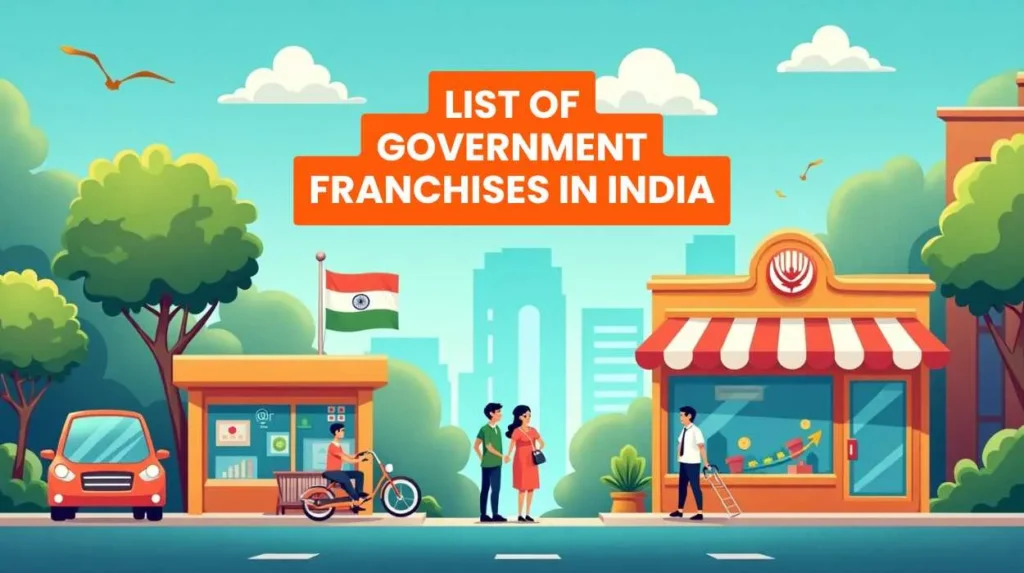Government Franchises in India are unique and offer business professionals a chance to make a profit as they support the growth of India’s economy. A list of government franchises in India provides aspiring entrepreneurs with options backed by government organizations, which bring a better brand image, well-defined business systems, as well as constant operational management. Since the need for service provision and businesses that foster the development of the nation rises, franchises backed by the government are gaining a better reception for those who seek to create a difference as they earn.
What do you mean by Government Franchise?
A government franchise is a unique business model where the government or a public sector unit (PSU) allows a private individual or company to run a business under its name, with the backing and support of the government. It’s similar to owning your own business, but with the added security and guidance of a government entity.
These types of government franchise opportunities in India often focus on providing essential services that benefit the community or support government projects. Examples include running postal services, offering banking options in rural areas, or distributing government-subsidized products. The government or PSU usually provides franchisees with the necessary training, resources, and sometimes even physical facilities to help them get started.
In return for this support, franchisees agree to operate within certain rules and standards set by the government to ensure quality and consistency. Initiatives like “Make in India” encourage this kind of model to promote entrepreneurship and strengthen local economies.
Landscape of Government Franchises in India
Government franchise options are emerging in 2025 as a great entry point for small-town entrepreneurs, first-time founders, and service-oriented individuals. A list of government franchises in India offers opportunities with strong brand recognition, proven business models, and state support.
These franchises span industries like banking and healthcare, with investments ranging from ₹5 lakhs to ₹50 lakhs. They provide training, operational assistance, marketing support, and consistent customer flow, making them low-risk alternatives to independent ventures. While regulations ensure quality, they may limit operational flexibility compared to private businesses.
Discover More Franchise-Based Topics:
Benefits of Investing in Government Franchises in India
- Strong Brand Recognition and Public Trust: Governments operating franchises have the advantage of automatically recognized brands, meaning that the franchisees will not struggle when it comes to clients’ loyalty.
- Proven Business Models: Government-supported franchises usually follow the existing standard and successful franchising strategies. It helps to reduce the odds of failure because franchisees implement a plan that has already succeeded.
- Government Support and Backing: Franchisees receive Government backing for financial concessions, allowances, and instructional facilities. It is usually of great operational advantage and carries less cost than backing from a commercial bank.
- Consistent Customer Flow: Several government franchises in India provide basic necessities that guarantee traffic. For example, Common Service Centers offer some key public services that users demand regularly and hence these resources generate steady revenues.
- Lower Risk Compared to Private Ventures: Since they are owned and backed by the government, these franchises are said to be less risky which makes their franchise investment opportunity quite secure.
- Social Impact: With the help of services that government franchises offer, such as supplying health and digital services, franchisees are also in a position to bring about social development.
- Stable Revenue Streams: As many government franchises address gain daily requirements, the advice has stable and predictable revenues, which can attract investors expecting fixed returns.
- Access to Government Schemes: Using results, the government often offers more beneficial schemes, policies, and financial incentives for the franchisees which can also decrease the operating costs and increase the franchisees’ profitability.
Key Sectors Offering Government Franchises
- Healthcare & Pharmaceutical: It is estimated that in the next 5 years, the franchise industry will touch a figure of $140-150 billion with Jan Aushadhi Kendras dominating the aspects of low-cost generic medicines distributions globally, with profit margins of 15-20% and active government support on the availability of healthcare to rural India.
- Banking and Financial Services: India Post Payments Bank (IPPB) leads the digital financial inclusion sector, occupying 150- 200 sq ft, with financial inclusion of the unbanked with 15-20% profit rates and full infrastructure government backing.
- Digital Services/E-Government: Common Service Centers (CSCs) offer high-profit-margin services with a 20-25% margin, requiring a minimum space of 100 to 150 sq ft. They are considered key points essential for delivering government services in rural regions.
- Skill Development & Education: Pradhan Mantri Kaushal Kendras and NSDC Centers specialize in artisan training, which yields 20-25% thus the engineering unit needs 3000-8000 sq ft plus, appropriately addressing the expanding skill needs of India with industrial associations.
- Transportation Retail: Retail in Indian Railways Station Retail Outlets are premium spaces with 25-30 % profit margins, and will leverage high footfall spaces with 100-500 square feet, enjoying year-round assurance of customer traffic.
- Food Security/Distribution: The Food Corporation of India Centers and IRCTC Food plazas ensure that food is distributed with a 15-30% margin. In contrast, vital public distribution systems maintain stable revenues through government-guaranteed business volumes.
Comparative Analysis Table
| Franchise Name | Investment (INR) | Space Requirement | Profit Margin | BreakEven Period |
| IPPB | 5-10 lakhs | 150-200 sq ft | 15-20% | 8-12 months |
| CSC | 20-25 lakhs | 100-150 sq ft | 20-25% | 6-8 months |
| Jan Aushadhi Kendras | 20-24 lakhs | 120-150 sq ft | 15-20% | 10-12 months |
| KVIC | 10-15 lakhs | 300-400 sq ft | 20-25% | 12-15 months |
| Railway Retail | 25-50 lakhs | 100-500 sq ft | 25-30% | 18-24 months |
| PMKK | 20-30 lakhs | 5000-8000 sq ft | 20-25% | 15-18 months |
| FCI Centers | 15-20 lakhs | 2000-3000 sq ft | 15-20% | 12-15 months |
| Ayushman Centers | 30-40 lakhs | 1000-1500 sq ft | 20-25% | 18-24 months |
| IRCTC Food Plaza | 40-50 lakhs | 500-1000 sq ft | 25-30% | 24-30 months |
| NSDC Centers | 25-35 lakhs | 3000-5000 sq ft | 20-25% | 15-18 months |
Also Read: MSME Business Ideas with Low Investment
List of Government Franchises in India: Top 10 Picks
1. Indian Post Payments Bank (IPPB)

Indian Post Payments Bank [IPPB] is a payments bank that is wholly owned by the Indian government to provide banking and financial services to the unbanked population and integrated with the largest post office and franchise network in the India. In its capacity as a franchise, IPPB empowers individuals and companies to provide basic, and in many instances, the only banking solutions despite the increasing competition from other regional and international players.
Savings accounts, money transfers, and payment of bills are some of the services offered by the franchisees to customers, hence helping in the country’s financial advancement. IPPB government franchises in India have advantages from support and a constantly emerging digital banking system, frequent technological upgrades, and different revenue sources that aim at an underserved rural population.
Why this Franchise?
- The fast-developing digital banking environment
- This gives credibility to government-related projects and assists in their funding.
- A high customer base still untapped in rural locations
- Multiple revenue streams
- Regular technological updates
Investment & Requirements
- Initial Investment: ₹5-10 lakhs
- Space Requirement: 150-200 sq ft
- Profit Margin: 15-20%
- Break Even: 8-12 months
Potential Benefits/Revenue: Monthly revenue potential of $0-40,000 to $80,000 through banking services, money transfer, and digital payments, with 15-20% margins.
Contact Details: IPPB Customer Care – 1800-266-6868 | www.ippbonline.com
2. Common Service Centers (CSC)

CSCs are the central repositories that are used in the provision of government e-services to the hard-to-reach population. Through these centers, formal and informal, government and private entities, hope to establish a link to the people, where they may be given easy access to important services such as payment of bills, banking, insurance, and several governmental and social security schemes. CSC franchises have this noble role of minimizing the digital divide because they offer easy accessibility to such services.
Of significant importance to many entrepreneurs, buyer demand is constant, list of government franchise in India backing is frequently provided, and there is a diverse scope of service to offer, which makes Franchises a suitable choice for public service. About the analysis of these origination types, it has been observed that CSCs play a major role in improving the demographic’s literacy and financial sector integration throughout India.
Why this Franchise?
- The categorization of the service providers as ‘essential’
- Multiple service offerings
- Growing digital adoption
- Government support structure
- Regular income streams
Investment & Requirements
- Initial Investment: ₹20-25 lakhs
- Space Requirement: 100-150 sq ft
- Profit Margin: 20-25%
- Break Even: 6-8 months
Potential Benefits/Revenue: ₹30,000- 60,000 per month in potential earnings due to a variety of services in the form of commissions and as a service provided through digital transactions.
Contact Details: helpdesk@csc.gov.in – www.csc.gov.in
3. Jan Aushadhi Kendras

Jan Aushadhi Kendras are selling medicine under the Pradhan Mantri Bhartiya Janaushadhi Pariyojana (PMBJP), whose aim is to provide quality ‘generic’ medicine at cheap prices. The franchise’s operation concept is to produce and deliver healthcare solutions at cheaper prices with an emphasis on hard-to-reach populations.
By nature, top government franchises in India operate consistently due to the constant demand for healthcare services and government encouragement of cheap medication. It also generates revenue and a social return on investment for public health across India. The Jan Aushadhi Kendras established the sale of the cheapest or generic medicines, thereby foresaw the reduction of public health costs.
Why this Franchise?
- Growing healthcare sector
- Essential service
- Strong government support
- Regular customer base
- Social impact
Investment & Requirements
- Initial Investment: ₹20-24 lakhs
- Space Requirement: 120-150 sq ft
- Profit Margin: 15-20%
- Break Even: 10-12 months
Potential Benefits/Revenue: Turnover 15-20%-3-8 Lakh every month on the value of generic medicine and healthcare products sold.
Contact Details: PMBJP Helpline – https://janaushadhi.gov.in/ | Email: pmbjp@nic.in
4. Khadi and Village Industries Commission (KVIC)

KVIC franchises encourage, promote, and market authentic Indian arts, crafts, handlooms, and village industry products. These outlets serve as marketing hubs for Khadi-branded apparel, handicrafts, and eco-friendly products, catering to consumers who value traditional and sustainable items.
A list of government franchises in India highlights opportunities like KVIC that offer strong brand recognition, cultural value, and niche positioning. By focusing on local materials and skills, these franchises align with growing consumer interest in sustainable products while benefiting from government support and promotion.
Why this Franchise?
- Expanded market share of historical commodities
- Strong brand recognition
- Support for local artisans
- Regular product updates
- Cultural significance
Investment & Requirements
- Initial Investment: ₹10-15 lakhs
- Space Requirement: 300-400 sq ft
- Profit Margin: 20-25%
- Break Even: 12-15 months
Potential Benefits/Revenue: Sales of ₹2-5 lakh monthly with 20-25 percent of profitability of conventional handloom and eco-friendly goods.
Contact Details: KVIC Head Office – 011-26926183 | www.kvic.gov.in
5. Indian Railways Station Retail Outlets

Indian Railways Station Retail Outlets are specialized retail franchises located at train stations, offering food, books, and convenience products to daily commuters. These outlets benefit from prime locations and consistent footfall, making them highly visible and profitable.
A list of government franchises in India includes such opportunities, where franchise owners can choose from pre-established business models, enjoy year-round operations, and build a loyal customer base among Indian Railways travelers.
Why this Franchise?
- Guaranteed footfall
- Prime locations
- Multiple business options
- Established infrastructure
- Year-round business
Investment & Requirements
- Initial Investment: ₹25-50 lakhs
- Space Requirement: 100-500 sq ft
- Profit Margin: 25-30%
- Break Even: 18-24 months
Potential Benefits/Revenue: High passenger footfall will result in average monthly revenue of 25-30 lakh with a profit margin of 25-30%.
Contact Details: Indian Railways Commercial Department – www.indianrailways.gov.in
6. Pradhan Mantri Kaushal Kendras (PMKK)

PMKKs are PMKVY partners for appeal and acknowledgment of training centres that operate under the Skill India mission and offer training in vocations to bridge the capability void in trade segments. These franchises provide some of their courses in the IT, retail, and health sectors for learners with employment intentions. PMKKs receive governmental subsidies and maintain extensive cooperation with industries which guarantees a constant stream of applicants and a great number of courses.
On the one hand, it offers a lucrative opportunity to list of government franchise in India as there is the support of the Indian government and a great feeling of helping develop skills and employment in India. PMKK centres play an important role in skill development, particularly in India, by providing young people with skills that make them employable.
Why this Franchise?
- Rising importance of skill acquisition
- Government subsidies
- Regular student flow
- Multiple course offerings
- Industry partnerships
Investment & Requirements
- Initial Investment: ₹20-30 lakhs
- Space Requirement: 5000-8000 sq ft
- Profit Margin: 20-25%
- Break Even: 15-18 months
Potential Benefits/Revenue: 1-3 lakhs monthly on training fees, government subsidies and certification programs.
Contact Details: PMKVY Helpline – 08800055555 | www.pmkvyofficial.org
7. Food Corporation of India (FCI) Distribution Centers

FCI Distribution Centers are an important part of India’s food security and are used to store and distribute food grains for the proper functioning of the public distribution system. One of the crucial advantages of being a franchisee is the minimum guaranteed business volume immediately traceable to the nature of FCI’s services and affirmative support of the government.
As one of the best among list of government franchises in India targets audience’s benefit from stable revenues and social missions that help provide food options to Indians. These centres are suitable for any intending entrepreneur who wants to go into a government-endorsed business with a fixed profit margin and also help in the country’s food security.
Why this Franchise?
- Essential service status
- Guaranteed business volume
- Government support
- Regular income
- Social impact
Investment & Requirements
- Initial Investment: ₹15-20 lakhs
- Space Requirement: 2000-3000 sq ft
- Profit Margin: 15-20%
- Break Even: 12-15 months
Potential Benefits/Revenue: ₹2-4 lakhs award per month with 15-20% margins by switching food grains distribution and storage services.
Contact Details: FCI Head Office – 011-24360043 | https://dfpd.gov.in/
8. Ayushman Bharat Health Centers

Ayushman Bharat Health Centers is a part of India’s flagship health program, which has facilities for basic health care services, diagnostics, and preventive services. The above franchises are important in meeting growing healthcare needs in this country, especially in the rural areas. By the end of franchisees, they are establishing steady patient traffic, government subsidies, and additional revenue sources in diagnostic as well as treatment segments.
A list of government franchises in India includes such centers, which run through volume business since it is an essential service provider across the country, thus making a positive impact in the lives of the community. This franchise is perfect for business people who want to impact the communities while conducting business in an expanding market.
Why this Franchise?
- Growing healthcare sector
- Government backing
- Regular patient flow
- Multiple revenue streams
- Essential service status
Investment & Requirements
- Initial Investment: ₹30-40 lakhs
- Space Requirement: 1000-1500 sq ft
- Profit Margin: 20-25%
- Break Even: 18-24 months
Potential Benefits/Revenue: Love health care services and diagnostic procedures monthly revenue of ₹3-6 lakhs with 20-25 percent margins.
Contact Details: Ayushman Bharat Helpline – 14555 | https://abdm.gov.in/
9. IRCTC Food Plaza

IRCTC Food Plazas are central Food Plaza System set up at essential railway stations to provide improved eating routines for travelers. These plaza franchises are located in areas with lots of traffic hence a constant stream of clients. The partners get demands from IRCTC with a reputable brand a focus on hygiene and services and a constant flow of cash.
The range of cuisine styles available at IRCTC Food Plazas includes multiple choices making it possible to satisfy different customers. This government franchise is ideal for the food industry, and those interested in the booming Indian rail network and its strong infrastructure.
Why this Franchise?
- Premium locations
- High footfall
- Strong brand value
- Multiple cuisine options
Investment & Requirements
- Initial Investment: ₹40-50 lakhs
- Space Requirement: 500-1000 sq ft
- Profit Margin: 25-30%
- Break Even: 24-30 months
Potential Benefits/Revenue: A turnover of ₹5-10 lakh monthly and margin of 25-30% on food services and high footfall at the railway stations.
Contact Details: IRCTC Customer Care – 0755-6610661 | www.irctc.com
10. National Skill Development Corporation (NSDC) Centers

National Skill Development Corporation Centers offer training in all fields to improve employment prospects. These government franchises in India are vital for establishing Indian human resources, training them, and providing a wide array of courses that include information technology, hospitality, and construction, among others. Franchisees have daily or weekly student registration and have business links with industries and government hence is a worthwhile business.
Through NSDC’s centres, the country’s prepared requirements for workforce development are met the centres, providing gaps between the industries and skills. This franchise offer suits people passionate about education and training to develop valuable skills for employment in the Indian market.
Why this Franchise?
- Growing skill development sector
- Government support
- Multiple course offerings
- Industry partnerships
- Regular student enrollment
Investment & Requirements
- Initial Investment: ₹25-35 lakhs
- Space Requirement: 3000-5000 sq ft
- Profit Margin: 20-25%
- Break Even: 15-18 months
Potential Benefits/Revenue: ₹2-4 lakhs/ month by conducting skill training, certifications and collaboration with industry partners.
Contact Details: NSDC Helpline – 1800-123-9626 | www.nsdcindia.org
Most Picked Government Franchises in India
| Government Franchise | Overview | Benefits / USP | Revenue Model / Customer Base |
| Indian Railways Station Retail Outlets | Retail outlets set up at Indian Railways stations | High footfall, visibility, diverse customer base (tourists, business travelers, commuters) | Revenue from daily customers, impulse purchases, recurring demand from travelers |
| Common Service Centers (CSCs) | Provide basic services like utility payments, e-governance, and internet connectivity, especially in rural & semi-urban areas | Low capital investment, easy entry into entrepreneurship, government-backed, focus on digital inclusion | Revenue from providing various government and utility services, repeat customers due to essential services |
| LIC Franchises | Insurance services (life insurance) in areas with limited connectivity | Quick breakeven, government-backed, builds trust and credibility | Revenue from selling insurance policies and recurring premium collection |
| Jan Aushadhi Kendras | Stores providing affordable generic medicines | Affordable healthcare and medicines, high visibility, government support, low marketing costs | Revenue from repeat customers filling prescriptions, steady demand from urban and rural populations |
How to Choose the Right Government Franchise in India
Financial Assessment & Investment Analysis
Calculate all the investible capital with the setup cost, working capital, and operation costs within the first 12-18 months. Government-franchised rates will be between 5-30 lakhs (IPPB) up to 50-30 lakhs (IRCTC Food Plaza), with the majority of the cost subject to an extra 20-30% contingency. Think of financing such as government schemes, bank loans as well as subsidies.
Creditors will work on the profit generated according to the profit margins provided: CSCs will give 20-25% of profit with the break-even period after 6-8 months, whereas the put-up of Railway outlets will provide 25-30% prospects of profit and will need at least 18-24 months break-even. Include franchise fee, royalty, and cost of compliance in the financial planning process to be accurate.
Market Demand & Location Viability
Perform an extensive demographic survey on your target location in terms of population density, remoteness levels and service demands. CSCs work more efficiently in rural localities where there is a lack of connectivity to the digital world and Railway outlets are found in busy urban stations.
Evaluate competition and saturation in the market – target markets and others operational should have an unfilled gap in services and not excessive. Take infrastructure such as electricity supply, availability of internet services and access to transport. Determine the accessibility and parking facilities to customers to create sustainable business.
Regulatory Compliance & Documentation
Learn the licensing criteria of your franchise industry. Such franchise as healthcare also needs drug licenses and FSSAI certification of food goods. Banking franchises require approvals of the RBI and financial approval certifications.
Make certain that franchise deals, territory and working requirements are absolutely clear. Examine any policy change with government policies that fit into your industry and evaluate the stability of regulation over the long term. Be ready to accept frequent audits and reporting compliance requirements which may lead to flexibility of the operation.
Support System Evaluation
Evaluate franchisor training packages, operating manuals and hook-up arrangements. Good franchises offer 2-4 weeks new franchise trainings (initially), frequent refreshers and special support staff. Consider the marketing support such as national campaigns, advertising materials and help with online presence.
Infrastructure Check technology infrastructure delivered, particularly as regards digital service franchise of such nature that needs periodic software update and technical assistance. See conflict resolution mechanisms and feedback systems on how to resolve challenges in operation by the franchisees.
Skill Matching & Management Capability
Compare your current developed competencies with franchise demands – technical franchise requires computer literacy skills and retail stores require stock management skills. Evaluate your ability to manage personnel to hire, train and keep them.
Take into account time commitment demands since the majority of government franchises engage the individual intervention and not inactive investment. Assess the time of learning curve and readiness to learn new skills. Contemplate or have an exit or succession planning as per transferability rules and regulations of the franchise.
Step-by-Step Guide for starting a government franchise
Starting a government based franchise in India can be a profitable business opportunity. Here’s a step-by-step guide:
- Research Available Government Franchises: Look for sectors that align with your interests, such as education, healthcare, or retail, and check which franchises are available under government schemes.
- Understand Terms & Conditions: Each Govt based franchise may have different investment requirements, different royalty structures, and support systems. Be clear on these before proceeding to start any of these.
- Complete Registration & Legal Documentation: Ensure you meet all the required legal requirements for starting a franchise, including registering with local authorities and following government guidelines.
- Conduct Market & Location Research: Determine the best location for your franchise based on demand and competition.
- Comply with Regulations: Understand the franchise agreement and government policies relevant to the franchise industry.
For a more detailed exploration of starting a government franchise, consider referring to resources on specialized websites or government portals.
Legal and Regulatory Aspects of a Government Based Franchise Business
Starting any of government franchise in India involves complying with some legal and regulatory requirements. Here’s a breakdown:
- Business Registration: You must register your chosen franchise model as a legal entity, either as a sole proprietorship, partnership, or limited company. Register with the govt like the Ministry of Corporate Affairs (MCA) for a Corporate Identity Number (CIN).
- Franchise Agreement: This legally binding document must detail the terms and conditions between the franchisor and franchisee, including royalties, rights, and obligations.
- Licenses & Permits: Depending on the industry (e.g., healthcare, food), specific licenses or certifications (such as FSSAI for food businesses) are required.
- Tax Compliance: Apply for GST Registration if your turnover exceeds the threshold and comply with other applicable taxes.
- Intellectual Property: Ensure that your franchise agreement fullfilled like trademarks and other intellectual property rights.
- Local Laws & Regulations: Each state may have its own set of requirements, such as zoning laws, environmental regulations, and employee welfare provisions.
- Consumer Protection Laws: Adhere to consumer protection laws such as the Consumer Protection Act, which governs product and service quality.
Challanges Faced by Government Franchises in India
- Higher Initial Investment in Some Cases: It is noteworthy that many are at low cost while others, for instance, the Indian Railways retail outlets may call for a heavy capital outlay for setting up stations and other facilities and conforming to other requirements.
- Strict Compliance Requirements: Government franchise opportunities in India operations are generally with high compliance issues. Unlike independent businesses, several rules and regulations apply to franchisees can make the business even more complicated.
- Limited Operational Flexibility: The government regulations may actually impose some structural constraints on the decision-making processes of the franchisees, for instance, product differentiation and prices.
- Complex Application Processes: Acquiring a business from the government entails going through rather long and somewhat complicated procedures, especially for first-time business persons.
- High Competition in Premium Locations: Government franchises especially the railway stations may find it hard to secure strategic places since the areas are considered high demand.
- Regular Audits and Inspections: Quite often these franchises undergo audit checks to conform to government regulations which is time-consuming and creates pressure on the franchisees.
- Fixed Pricing: Some government franchises embrace the policy of set price categories causing firm selling prices and a small amount of earnings to vary with market requirements.
- Bureaucratic Delays: When government is involved especially in a country’s politics, it is characterized by bureaucratic policies that slow down the rate at which approvals, permits, or any changes needed by the business establishment are issued.
Also Read: Online Earning Apps Without Investment
Conclusion
It is noted that the Government franchises in India have a dual proposition, both as a business opportunity and as a social venture. A list of government franchises in India offers the new generation of business people proven business models, government encouragement, and the ability to contribute towards national growth. Each franchise type has its strengths and weaknesses, nonetheless, when choosing the right franchise there are special factors that should be considered such as personal capabilities, market study, and investment capability, it’s possible to end up with a sound franchise.
Frequently Asked Questions
1. Profitable Government Franchises in India
- India Post Franchise: Profitable for mail and retail services under India Post.
- Jan Aushadhi Kendra: Affordable medicines with government support.
- CSC Centers: Offers digital and e-governance services to rural and urban areas.
2. Which franchise is best under 50 lakhs?
The best franchises in India under 50 lakhs include:
- Amul Franchise: Dairy products with a strong brand and low setup costs.
- FirstCry: Baby and kids’ products with high demand in urban areas.
- DTDC Courier: Logistics and courier services with wide reach.
3. How much money can one start a Government franchises in India?
The minimum investment that can be made is around ₹2 lakhs for Common Service Centers, whereas to open specialty shops like IRCTC Food Plazas, one may have to invest as high as ₹50 lakhs or more.
4. When does one determine the period of government franchise approval?
It also takes 24 months to get approval, depending on the type of franchise to be offered and other competencies to be met.
5. Is it permissible for anyone to own more than one government franchise?
Yes, it is possible to own multiple government franchises depending on the stipulated rules and regulations of the government of that country, together with the operational rules and regulations of the franchise business opportunity.
6. Is business experience necessary for companies getting government franchises?
This kind of experience is not always required but is desirable. Most franchisers see to it that franchisees are well-trained, especially the neophyte ones in the business.
7. In what way do government franchises offer their assistance?
It covers introductory training, operational advice and assistance, promotional assistance, periodic progress reports, and the availability of governmental plans and facilities.

